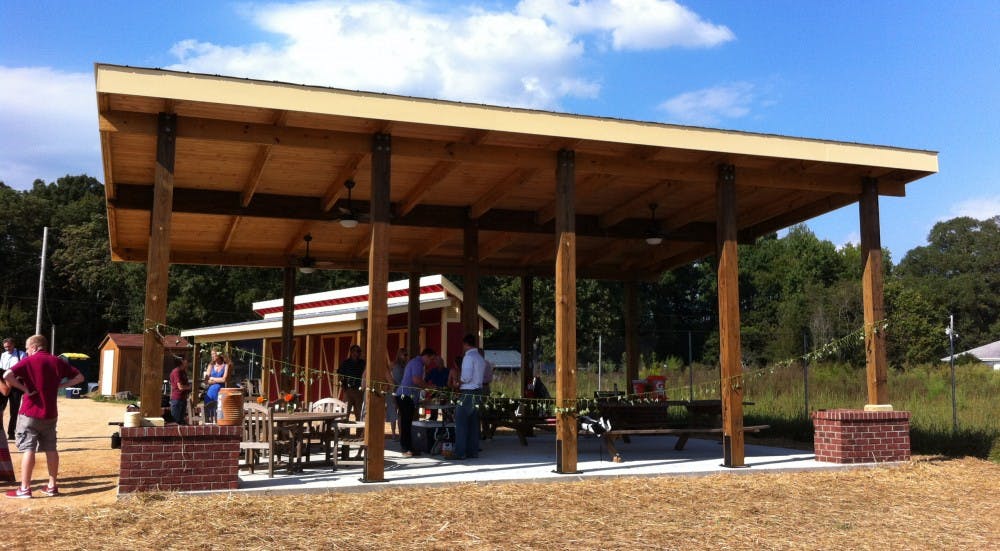In lieu of a ribbon, a sweet potato vine was cut Friday to celebrate the opening of a new pavilion at the Campus Farm.
The pavilion is an open-roofed structure on the Campus Farm designed to serve as an outdoor educational space. The construction began in mid-July and was finished earlier this week. The structure, which cost approximately $75,000, was built through a grant from the Charlotte-based Duke Endowment, as part of a collaborative sustainable agriculture initiative, and a gift from former University President Keith Brodie. Building a permanent physical structure also marks a significant moment for the farm.
“The pavilion is a sign that we are here to stay and here to grow, both agriculturally and educationally,” said Farm Fellow Emily McGinty, Trinity ‘13. “The farm has grown from an idea to an educational center and a community hub.”
The pavilion provides a weather shelter for farm workers. It also serves as a storage space for farm tools and provides a washing station. The roof is slanted to capture rainwater, which can be used for watering flowers and plants.
“We are going to make tobacco history and cotton history really interesting and sexy in a way that students have never heard before.”
Emily McGinty
Farm fellow, trinity ‘13
“Before the pavilion was built, we had no shelter on the farm,” said summer intern Henry Frank, a graduate student at the Divinity School. “If it starts pouring rain, we had nowhere to run.”
Former farm fellow Sarah Parsons, Nicholas ’12, said the new pavilion will attract students because there is now space to host more events.
“This is really important and useful to us because we now have an actual shady place to take a break from farm work,” Parsons said. “It also makes the farm more welcoming because now we can accommodate our guests, host bigger groups for workshops and teach more students about sustainable agriculture and food.”
The pavilion will host monthly workshops, which are currently centered around the historic cash crops of the Carolinas—tobacco and cotton—aiming at uncovering the mysteries of farming and highlighting history through hands-on experience.
“We are going to make tobacco history and cotton history really interesting and sexy in a way that students have never heard before,” McGinty said.
In October, the farm will host the annual Beet Festival to celebrate the fall harvest, during which people can make their own beet cake, beet beer and beet ice-cream.
“It’s just a fun way to gather and now all our basic needs are met,” McGinty added, laughing. “We used to have water and food, and now there’s a roof over our head—we have a shelter.”
The original design of the pavilion included a kitchen and a pizza oven, so that workshops featuring cheese-making and jam-making skills could be organized. Insufficient funding prevented the farm from including the idea in the final designs.
“We really hope to do this in the future,” Parsons said. “It will be cool to let people see the whole process of making food—from collecting the ingredients to cooking and to eating.”
For fellows and volunteers working at the farm, the pavilion not only serves practical purposes, but also symbolizes a community-building experience.
“It’s a great place for students to experience something they don’t usually get,” Frank noted.
Executive Vice President Tallman Trask cut the sweet potato vine with a pincer instead of scissors.
“We do things in the farm style,” McGinty said.
Farm manager Emily Sloss, Trinity ’10, welcomed the guests at the ceremony, spoke briefly about the pavilion and thanked everyone who contributed to the construction process.
“Hopefully this beautiful structure will provide many more years of interacting with students, workshops, senior theses, parties and times to meet the Duke community and connect around agriculture,” Sloss said.
Also present at the ceremony were Duke Forest Resource Manager Judd Edeburn, members of the DCF Board of Advisors, architects of the pavilion, farm staff and neighbors who have worked at the farm.
Get The Chronicle straight to your inbox
Signup for our weekly newsletter. Cancel at any time.

